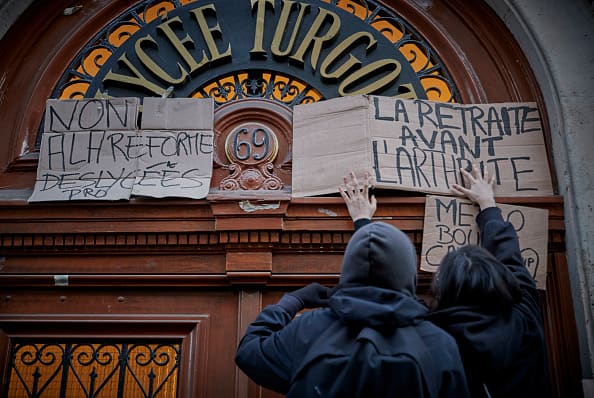'No To Reform': French Workers Stage Nationwide Strike Against President Macron's Bid To Raise Retirement Age. Key Points
The strikes are a crucial test for President Emmanuel Macron, who argues his pension reform plan, which polls indicate is extremely unpopular, is critical to preventing the system from collapsing.

French workers on Thursday embarked on a strike and marched throughout the country, delaying trains and cutting energy output in a statewide protest against the government's intention to raise the retirement age by two years to 64, news agency Reuters reported.
The strikes are a crucial test for President Emmanuel Macron, who argues his pension reform plan, which polls indicate is extremely unpopular, is critical to preventing the system from collapsing.
“I’ll have to prepare my walking frame if the reform goes through,” said Isabelle, 53, a social worker, saying her job was too tough to add two more years.
Brigitte Meny, an early retiree, stated that she was demonstrating in solidarity with former coworkers.
“Sixty-four it’s too old,” she said. “And I’m also here because I’m fed up with Macron.”
A big banner said "No to the Reform" in Nice, southern France.
Key Points
- According to Labor Ministry projections, raising the retirement age by two years and prolonging the pay-in period would generate an additional 17.7 billion euros ($19.1 billion) in annual pension contributions, allowing the system to break even by 2027.
- “This reform is necessary and fair,” Labour Minister Olivier Dussopt informed LCI TV. However, workers disagreed. "Salaries and pensions must be increased, not retirement age," read one enormous banner held by employees at the start of the protest march in Tours, western France.
- Unions say that there are other measures to preserve the pension system's survival, such as taxing the super-rich or boosting employers' or well-off retirees' payments.
- The task for them is to turn resistance to the reform – and frustration over a rising cost of living – into a huge social movement that will finally force the administration to reverse course.
- Union officials, who are expected to announce further strikes and rallies later in the day, said Thursday was just the start.
- Speaking with BFM TV, Laurent Berger, head of France’s largest union, CFDT stated: “We need a lot of people to join the protests. People are against this reform … we need to show it (in the streets).”
- The pension change still has to get through parliament, where Macron has lost his absolute majority but is looking for conservative backing.
- Among those who went on strike were train drivers, teachers, and refinery workers. Bus drivers and public servants also went on strike, and France Inter radio played a music playlist instead of its normal programming.
- According to the SNCF rail operator, just one-third to one-fifth of high-speed TGV lines were operational, with few local or regional trains running.
- Some metro stations in Paris were blocked, and traffic was severely interrupted, with only a few trains running.
- People scrambled to catch the few trains that were still running in the crowded Gare du Nord station, as staff in yellow vests assisted stressed travellers.
- Beverly Gahinet, a restaurant worker who missed work because her train was cancelled, said she supported the strike even if she was not participating.
- But not everyone was that understanding. “I don’t understand, it’s always the same (people) who are on strike … and we have to endure it,” said real estate worker Virginie Pinto, as she struggled to find a metro to go to work.
(With Inputs From Reuters)







































